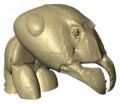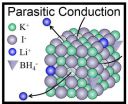(Press-News.org) This news release is available in German.
Music can be soothing or stirring, it can make us dance or make us sad. Blood pressure, heartbeat, respiration and even body temperature – music affects the body in a variety of ways. It triggers especially powerful physical reactions in pregnant women. Scientists at the Max Planck Institute for Human Cognitive and Brain Sciences in Leipzig have discovered that pregnant women compared to their non-pregnant counterparts rate music as more intensely pleasant and unpleasant, associated with greater changes in blood pressure. Music appears to have an especially strong influence on pregnant women, a fact that may relate to a prenatal conditioning of the fetus to music.
For their study, the Max Planck researchers played short musical sequences of 10 or 30 seconds' duration to female volunteers. They changed the passages and played them backwards or incorporated dissonances. By doing so, they distorted the originally lively instrumental pieces and made listening to them less pleasant.
The pregnant women rated the pieces of music slightly differently, they perceived the pleasant music as more pleasant and the unpleasant as more unpleasant. The blood pressure response to music was much stronger in the pregnant group. Forward-dissonant music produced a particularly pronounced fall in blood pressure, whereas backwards-dissonant music led to a higher blood pressure after 10 seconds and a lower one after 30 seconds. "Thus, unpleasant music does not cause an across-the-board increase in blood pressure, unlike some other stress factors", says Tom Fritz of the Max Planck Institute in Leipzig. "Instead, the body's response is just as dynamic as the music itself."
According to the results, music is a very special stimulus for pregnant women, to which they react strongly. "Every acoustic manipulation of music affects blood pressure in pregnant women far more intensely than in non-pregnant women", says Fritz. Why music has such a strong physiological influence on pregnant woman is still unknown. Originally, the scientists suspected the hormone oestrogen to play a mayor part in this process, because it has an influence on the brain's reward system, which is responsible for the pleasant sensations experienced while listening to music. However, non-pregnant women showed constant physiological responses throughout the contraceptive cycle, which made them subject to fluctuations in oestrogen levels. "Either oestrogen levels are generally too low in non-pregnant women, or other physiological changes during pregnancy are responsible for this effect", explains Fritz.
The researchers suspect that foetuses are conditioned to music perception while still in the womb by the observed intense physiological music responses of the mothers. From 28 weeks, i.e. at the start of the third trimester of pregnancy, the heart rate of the foetus already changes when it hears a familiar song. From 35 weeks, there is even a change in its movement patterns.
INFORMATION:
Original paper:
Thomas Hans Fritz , Marian Ciupek, Ambika Kirkland, Klas Ihme, Anika Guha, Jana Hoyer & Arno Villringer
Enhanced response to music in pregnancy
Psychophysiology, 19 May 2014
Receptive to music
Pregnant women respond to music with stronger physiological changes in blood pressure
2014-05-20
ELSE PRESS RELEASES FROM THIS DATE:
Update for Skunk Fire, Arizona
2014-05-20
The Skunk Fire which began as a lightning strike on Saturday, April 19 is currently 31,167 acres large including fire growth and back burns.The fire continues to move in a north westerly direction and an easterly direction towards ponderosa pine forest. South and North side of the fire is contained. The terrain for this fire is steep with scattered boulders making firefighting more difficult. The entire fire is currently 44% contained and full containment is expected by Friday, May 23, according to Inciweb.org.
The National Weather Service has forecast maximum temperatures ...
Boosting Immune process with IFN-γ helps clear lethal bacteria in cystic fibrosis
2014-05-20
Boosting a key immune process called autophagy with interferon gamma (IFN-γ) could help clear a lethal bacterial infection in cystic fibrosis, a new study suggests. The work, led by a team in The Research Institute at Nationwide Children's Hospital and published in PLoS One in May, offers new information about immune function in patients with the disease.
Cystic fibrosis, CF for short, is caused by a malfunction in the CFTR gene, which is responsible for transporting chloride and water across cell membranes. In people with the disease, cells that line the passageways ...
Scientists study biomechanics behind amazing ant strength
2014-05-20
A recent study into the biomechanics of the necks of ants – a common insect that can amazingly lift objects many times heavier than its own body – might unlock one of nature's little mysteries and, quite possibly, open the door to advancements in robotic engineering.
A small group of engineers at The Ohio State University combined laboratory testing and computational modeling conducted at the Ohio Supercomputer Center to determine the relationship between the mechanical function, structural design and material properties of the Allegheny mound ant (Formica exsectoides). ...
New lithium battery created in Japan
2014-05-20
WASHINGTON D.C., May 20, 2014 -- The long life of lithium ion batteries makes them the rechargeable of choice for everything from implantable medical devices to wearable consumer electronics. But lithium ion batteries rely on liquid chemistries involving lithium salts dissolved in organic solvents, creating flame risks that would be avoided if the cells were completely solid-state.
Now a team of researchers at Tohoku University in Japan has created a new type of lithium ion conductor for future batteries that could be the basis for a whole new generation of solid-state ...
Reading privacy policy lowers trust
2014-05-20
Website privacy policies are almost obligatory for many online services, but for anyone who reads these often unwieldy documents, trust in the provider is more commonly reduced than gained, according to US researchers.
Almost every commercial website, social network, search engine and banking site has a privacy policy. Indeed, these and countless other sites that scrape personal information via forms, logins and tracking cookies are obliged by law in some parts of the world to post a document online giving details of how they protect any personal data you give the site ...
Can mobile phones cause allergic reactions?
2014-05-20
New Rochelle, NY, May 20, 2014—Studies have identified mobile phones and related devices as sources of metal sensitization and potential causes of allergic contact dermatitis (ACD). Despite efforts to control allergen release in phones, many phones on the market release levels of metals, such as nickel and chromium, which are sufficient to induce ACD, according to an article in Pediatric Allergy, Immunology, and Pulmonology, a peer-reviewed journal published by Mary Ann Liebert, Inc., publishers. The article is available free on the Pediatric Allergy, Immunology, and Pulmonology ...
Climate change brings mostly bad news for Ohio
2014-05-20
COLUMBUS, Ohio— Scientists delivered a mostly negative forecast for how climate change will affect Ohioans during the next year or so, and well beyond.
Researchers report that the projected increase in precipitation and the associated runoff will likely lead to a larger-than-average bloom of harmful blue-green algae in Lake Erie this summer. In addition, the development of an El Niño over the Pacific later this year may result in a very dry 2015 in Ohio. But Ohio may fare better than its neighbors in one respect: While drought and high temperatures are expected to shrink ...
NIH researchers discover key factor in early auditory system development
2014-05-20
Researchers at the National Institutes of Health have uncovered a molecule in an animal model that acts as a key player in establishing the organization of the auditory system. The molecule, a protein known as Bmp7, is produced during embryonic development and acts to help sensory cells find their ultimate position on the tonotopic map, which is the fundamental principle of organization in the auditory system. The tonotopic map groups sensory cells by the sound frequencies that stimulate them. The study is the first to identify one of the molecular mechanisms that determines ...
Is there really cash in your company's trash?
2014-05-20
This news release is available in French. One company's trash can be another's treasure.
Take Marmite. Made from a by-product of commercial beer production, the yeast-based spread has topped toast throughout the Commonwealth for decades. By recuperating the waste product from one company, another was able to thrive.
Environmental concerns are at the forefront of government policy, so the time is right for companies worldwide to adopt this type of resource exchange, known as industrial symbiosis (IS).
A new study by Concordia University researcher Raymond Paquin ...
Engineers build world's smallest, fastest nanomotor
2014-05-20
VIDEO:
Cockrell School of Engineering assistant professor Donglei (Emma) Fan and her mechanical engineering team have built the fastest, smallest nanomotor to date. The team's nanomotor could enable controlled drug delivery...
Click here for more information.
Researchers at the Cockrell School of Engineering at The University of Texas at Austin have built the smallest, fastest and longest-running tiny synthetic motor to date. The team's nanomotor is an important step toward ...
LAST 30 PRESS RELEASES:
Bacteria frozen in ancient underground ice cave found to be resistant against 10 modern antibiotics
Rhododendron-derived drugs now made by bacteria
Admissions for child maltreatment decreased during first phase of COVID-19 pandemic, but ICU admissions increased later
Power in motion: transforming energy harvesting with gyroscopes
Ketamine high NOT related to treatment success for people with alcohol problems, study finds
1 in 6 Medicare beneficiaries depend on telehealth for key medical care
Maps can encourage home radon testing in the right settings
Exploring the link between hearing loss and cognitive decline
Machine learning tool can predict serious transplant complications months earlier
Prevalence of over-the-counter and prescription medication use in the US
US child mental health care need, unmet needs, and difficulty accessing services
Incidental rotator cuff abnormalities on magnetic resonance imaging
Sensing local fibers in pancreatic tumors, cancer cells ‘choose’ to either grow or tolerate treatment
Barriers to mental health care leave many children behind, new data cautions
Cancer and inflammation: immunologic interplay, translational advances, and clinical strategies
Bioactive polyphenolic compounds and in vitro anti-degenerative property-based pharmacological propensities of some promising germplasms of Amaranthus hypochondriacus L.
AI-powered companionship: PolyU interfaculty scholar harnesses music and empathetic speech in robots to combat loneliness
Antarctica sits above Earth’s strongest “gravity hole.” Now we know how it got that way
Haircare products made with botanicals protects strands, adds shine
Enhanced pulmonary nodule detection and classification using artificial intelligence on LIDC-IDRI data
Using NBA, study finds that pay differences among top performers can erode cooperation
Korea University, Stanford University, and IESGA launch Water Sustainability Index to combat ESG greenwashing
Molecular glue discovery: large scale instead of lucky strike
Insulin resistance predictor highlights cancer connection
Explaining next-generation solar cells
Slippery ions create a smoother path to blue energy
Magnetic resonance imaging opens the door to better treatments for underdiagnosed atypical Parkinsonisms
National poll finds gaps in community preparedness for teen cardiac emergencies
One strategy to block both drug-resistant bacteria and influenza: new broad-spectrum infection prevention approach validated
Survey: 3 in 4 skip physical therapy homework, stunting progress
[Press-News.org] Receptive to musicPregnant women respond to music with stronger physiological changes in blood pressure




